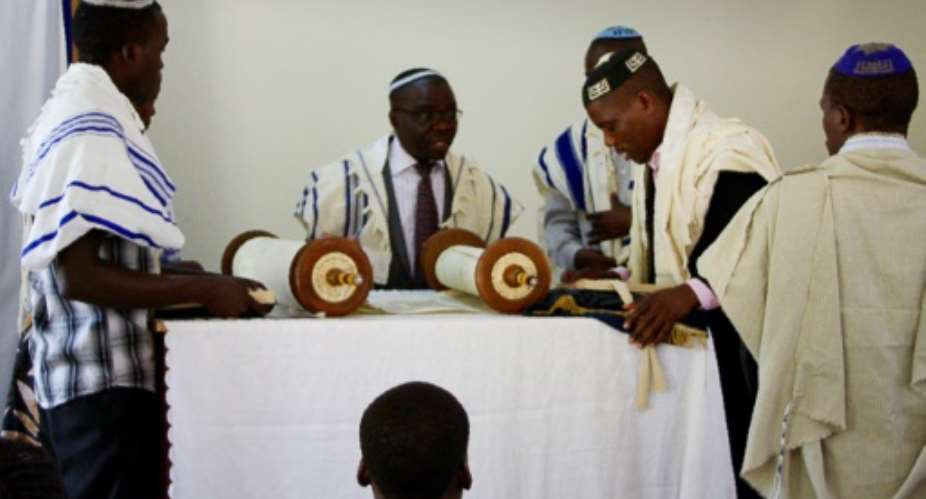Mbale (Uganda) (AFP) - In a candlelit room in a small eastern Ugandan village Rabbi Gershom celebrates the 'kiddush' meal over wine as his wife, Tzieorah, removes a cloth covering the 'challah' bread.
"Shabbat shalom!" cry the arriving guests. The scene is recognisable to every Jewish family - except the main dish is stewed goat and mashed green banana, with sweet pineapple, fresh from the garden, for pudding.
Gershom is the spiritual leader of the Abayudaya, a small community of African Jews living close to the town of Mbale, where the craggy edges of Mount Elgon mark the nearby border with Kenya.
They hope that Monday's visit to Uganda by Israeli Prime Minister Benjamin Netanyahu will mark the beginning of greater ties with the wider Jewish community.
- Charismatic founder -
The group's founder was a military officer, Semei Kakangulu, who was converted by Christian missionaries but then switched to Judaism in the early 20th century.
"He discovered the true religion and the true Sabbath day, that circumcision is mandatory, and began to follow the dietary laws of kashrut. He became a Jew," says Joab Jonadab, the local mayor and Gershom's brother.
Kakungulu's influence meant the community quickly grew. "My father was one of the initial followers," says Gershom. "By the end of the first year there were over 8,000 new Jews."
But when their charismatic leader died in 1928 the Abayudaya lost ground to zealous Christian missionaries and their mania for conversion. The community dwindled to fewer than a thousand.
For decades afterwards, Uganda's Jews lived in relative isolation. Cut off from the Jewish world they developed a syncretic form of worship combining, for example, traditional Hebrew songs with African melodies, yet they yearned for a stronger connection to Israel.
Israel Siridi, the community member responsible for circumcising infant boys, hopes Netanyahu's visit will mean recognition.
"Last year, Israel's Jewish Agency recognised us as Jews for the first time. We hope that our prime minister Netanyahu will lift the visa restrictions on us so we can go and study and pray in Israel," he said.
- Hope of recognition -
Days before Netanyahu's arrival, it seemed Siridi's prayers had been answered. Gershom gathered the community beneath the spreading branches of a large acacia tree to deliver some welcome news: he had received a letter from an Israeli rabbi saying the country's interior ministry "is to formally recognise the Abayudaya as Jews".
The community hopes recognition might also offer protection from persecution of the kind that threatened to wipe them out when the notorious Ugandan leader Idi Amin turned on the Abayudaya in the 1970s.
"When Idi Amin was president, he forbade Judaism and outlawed Jewish practice. His soldiers destroyed our synagogue, our elders were thrown in jail, tortured and killed," said Jonadab. "Amin said 'Africa is for the Africans' and he didn't see us as African enough."
Today the Abayudaya are thriving once again -- a revival Jonadab credits to President Yoweri Museveni, calling him "a good Pharaoh for us".
But the insecurities of a small community remain. "The Abayudaya are a tiny minority," says Gershom, who nevertheless was recently elected to parliament.
"It is not safe for us to live as a small group of isolated Jews in the heart of Africa. That's why recognition by Israel means so much to us. If anything bad happens to the Jews of Uganda the whole world will know," he said.





 Ghana will make maiden voyage into space should Bawumia become President — Chair...
Ghana will make maiden voyage into space should Bawumia become President — Chair...
 Train crash: Despite the sabotage, we shall not be deterred and will persevere —...
Train crash: Despite the sabotage, we shall not be deterred and will persevere —...
 Tema-Mpakadan railway project a perversion of the original viable concept design...
Tema-Mpakadan railway project a perversion of the original viable concept design...
 Train crash: Elsewhere, everyone involved in the test will either be fired or re...
Train crash: Elsewhere, everyone involved in the test will either be fired or re...
 Ghana, other election bound-countries must build fiscal buffers – IMF admonishes
Ghana, other election bound-countries must build fiscal buffers – IMF admonishes
 Parliament reconvenes late May, denies Speaker Bagbin delaying recall over NDC t...
Parliament reconvenes late May, denies Speaker Bagbin delaying recall over NDC t...
 $100m needed to revitalise Ghana's poultry sector — GNAPF
$100m needed to revitalise Ghana's poultry sector — GNAPF
 Driver arrested for causing train collision on Tema-Mpakadan Railway Line
Driver arrested for causing train collision on Tema-Mpakadan Railway Line
 Police grab trucker for Tema-Mpakadan rail accident
Police grab trucker for Tema-Mpakadan rail accident
 Gov't plans to revise traditional customs following Gborbu child marriage
Gov't plans to revise traditional customs following Gborbu child marriage
